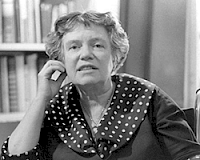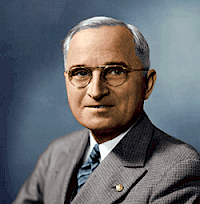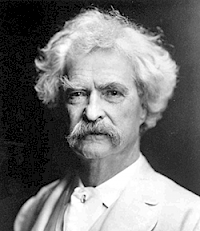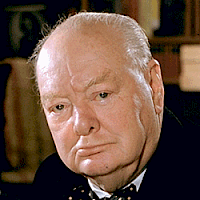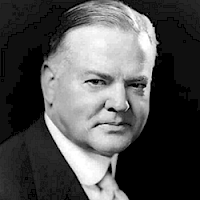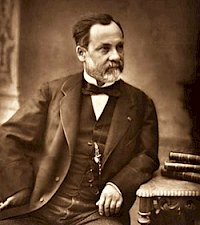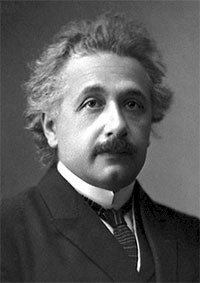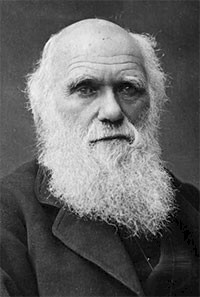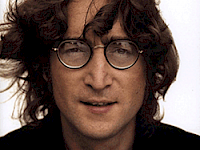Top ten quotes that influenced my career
Bill Dennison · | Science Communication | Applying Science |"Never doubt that a small group of thoughtful, committed citizens can change the world. Indeed, it's the only thing that ever has." Margaret Mead (1901-1978)
This Margaret Mead quote is my favorite quote associated with building a team of competent people working on environmental issues. The quote is very empowering, as it reminds us that changing the world is not simply in the province of large organizations or powerful individuals. Often the motivation for environmental research is to indeed 'change the world', but we are often afraid of over-reaching and will not verbalize our underlying desire. The Margaret Mead quote opens that door for anyone with aspirations to really make a difference. Margaret Mead was an interesting scientist and her personal history makes the source of this quote meaningful.
"It is amazing what you can accomplish if you do not care who gets the credit." Harry Truman (1884-1972)
I did not know the origin of this quote until recently, as it was drilled into to me by my maternal grandmother, Avis Cullen (1898-1996). She was an amazing woman, serving as a newspaper editor in a small college town and very active in the community. She was often motivating volunteers, and she emphasized how much more challenging it was to motivate them versus employees. Being committed to a cause over personal advancement was something that is antithetical to the academic 'publish or perish' rubric, and I like that the quote can be attributed to an underrated Midwestern President, Harry Truman.
"I've never let my school interfere with my education." Mark Twain (1835-1910)
It would be hard to put together any list of quotes and not include one from Mark Twain, whose wit and insight are timeless. The distinction between formal education and learning is made here, and I heartily endorse the distinction, even though most of my career has been in higher education. I feel as though my personal learning has benefited as much from the reading and experiences that have occurred outside my academic training as the formal education. This is one of my motivations behind my desire to transform academic training to experiential education. I also had an early experience of working alongside construction workers who were clearly intelligent but poorly educated, illustrating Twain's distinction.
"Americans will always do the right thing, after they've exhausted all the alternatives." Winston Churchill (1874-1965)
This Winston Churchill quote has been very applicable to me while living in the British Commonwealth. Being American has some baggage, but also carries some cache, as the quote so accurately conveys. The quote also has a lot of particular relevance in Australia, since Australian culture has been straddling British roots and modern American influences. I also enjoy telling this quote as a joke, with a pregnant pause in the middle providing dramatic effect. If the first part is said with authority, it can sound quite pompous, but the zinger pokes fun at my own expense. Another aspect of telling a good Churchill quote is that it conjures up so many other excellent Churchill quotes. It is worth noting that Churchill's mother was American, so he knew what he was talking about regarding Americans.
"Wisdom consists not so much in knowing what to do in the ultimate as knowing what to do next." Herbert Hoover (1874-1964)
The reason that I like this Herbert Hoover quote is the distinction between creating the broad vision, which is more easily shared among individuals, and making the difficult decisions about what is the immediate priority. The other aspect to this quote that I appreciate is the implicit assumption that the immediate next step is constrained by the time and resources available. What I read into the quote is that rather than waiting around for all the resources to be available before starting out, the quote is conveying the need to get started with what is available. Before Hoover became US President, he was a successful practical engineer who traveled widely, including a stint in Western Australia.
"Wisdom is knowing what to do next, virtue is doing it." David Starr Jordan (1851-1931)
I like to follow the Hoover quote about wisdom with this David Starr Jordan quote. In this quote, the appeal is to differentiate between the intellectual understanding and the application of this knowledge. In many respects, the quote embodies the intent of the Scholarship Reconsidered tenets of scholarship: integration (wisdom) and application (doing). I also like that 'virtue' is the aspiration of this quote, and differentiates virtue from wisdom. It is not enough to be smart, but it is your actions that really count. It is interesting that this quote comes from a prominent academic scientist. Jordan was an ichthyologist and became President of Stanford University.
"There are no such things as applied sciences, only applications of science." Louis Pasteur (1822-1895)
It was after becoming aware of Louis Pasteur's 'Quadrant' (Pasteur's Quadrant: Basic Science and Technological Innovation; D. Stokes, Brookings Institution Press, 1997) and becoming interested in Pasteur's life, that I came upon this quote. Pasteur embodied the best combination of conducting fundamental research (e.g. creating the field of microbiology) and also solving pressing problems (e.g. developing a rabies vaccine), which makes this quote from him resonate. I have fought making the distinction between basic and applied research throughout my career, and really appreciate the way Pasteur destroys the artificial separation.
"Make everything as simple as possible, but not simpler." Albert Einstein (1879-1955)
This quote addresses my belief that there is something particularly elegant about determining the essential elements of knowledge and effectively communicating these elements. The first part of this quote sets the goal of simplifying as much as possible, but I also like the idea that there is a fundamental limit to the degree that something can be simplified. This second part of the quote is attractive, since it is our mantra of science communication that we like to 'raise the bar', rather than 'dumbing it down'. I think that Einstein's famous equation, e = mc2, is the ultimate simple, yet profound equation. There is a lot of math to derive and fully explain the concept of relativity, but the simplicity of the equation captures the essence of the concept.
"My love of natural science has been steady and ardent." Charles Darwin (1809-1882)
In his autobiography, Charles Darwin considers his tenacity and persistence in thinking about an issue as his strongest attribute. This tenacity is derived from his passion about natural science, as expressed in this quote. I share this steady and ardent love of both nature and science. I greatly admired George Beadle, the geneticist at The University of Chicago who would spend time with me and my graduate student colleagues. He continued to conduct experiments and write papers after he retired from the Presidency of the university and long after he received his Nobel Prize for Physiology. Beadle practiced science for as long as he was able to, and this is an expression of his steady and ardent love of natural science, which was not extinguished from his bout with administrative duties.
"Life is what happens when you are busy making other plans." John Lennon (1940-1980)
This line from a John Lennon song "Beautiful Boy (Darling Boy)" makes a nice quote, as it affirms the vicissitudes of life's journey and the unforeseen circumstances that affect the journey. To me, this quote, coming from a Liverpool boy who rose to unprecedented fame, does not mean that only bad things happen, rather unexpected good things can also happen. I also like the reminder that planning can only go so far, particularly 'strategic planning', something I believe is overrated (see Rework, by Jason Fried for a strong case against strategic planning). Beyond strategic planning, this quote calls for an openness to change and realization that our life journey is something that.
These favorite quotes are ones that I actually remember and carry around with me at all times. This is particularly relevant since I do not have a good memory for words and travel ‘light’ regarding quotes or facts. But I have had multiple occasions to call upon this short library of quotes, as I often find opportunities to share them. A reason that these quotes made my top ten list is that they touched something quite meaningful to me—and not once, but on several occasions. I used to enjoy reading the book Bartlett’s Familiar Quotations, but now there are many websites that list thousands of quotes, so it is easier to find a few quotes that are meaningful to each person. I think that it is a useful exercise to find those quotes from predecessors that have particularly meaning to each individual.
About the author
Bill Dennison

Dr. Bill Dennison is a Professor of Marine Science and Vice President for Science Application at the University of Maryland Center for Environmental Science.
